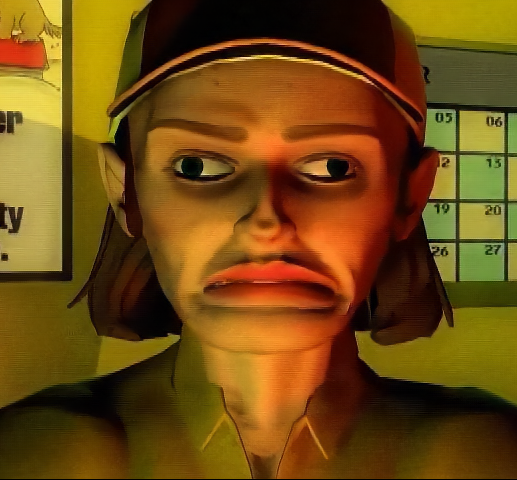Yeah turns out it wasn’t anonymity, that was estimated because the internet has a greater amoun of dickery than real life.
But really, Assholes online are also assholes in real life. Same for kibd people. What the internet did was allow assholes find and network with each other, and make environment uncomfoetable enough that kind people leave. Only assholes are left.
Really like how the artist used the “? face” to symbolize anonimity and drawing the after with real faces to tell that anonimity is gone.
I always though it was anonymity, but its more likely the missing human connection. On the internet, our thoughts are transmitted without seeing the person before us in real time, so some may act different, forgetting there is a person on the other side.
There’s obviously people who don’t give a shit, but they were just assholes to begin with.
Fear of retaliation by the physical human in front of you as well. Some people are good because they believe in the value of goodness but a lot of them only act right when they can’t get away with being awful.
Good old times
Defederate from him.
But he’s the dev. If we defederate we won’t get support, and since the software is a janky piece of crap we need that support.
Raising $600k after going public about dropping the N-bomb on a child might have something to do with this.
A few incredibly racist billionaires are financing endless waves of bigotry and brutality. Until they stop, this is only going to get worse.
Hate is victimized now and it is a powerful tool for controlling the masses.
Don’t feed the trolls
- Long forgotten adage, internet
Dead Internet Theory suggests these racist accounts are all just self-perpetuating whether you engage or not.
I thought I could feed trolls before midnight?
People on Lemmy are getting bad too, you can’t disagree with someone in the most inoffensive way without getting a response full of hateful comments or name calling. Like if had a face to face discussion with a stranger I wouldn’t be like “you’re a brain dead idiot and you’re stupid” that’s rude as fuck, but that’s just how people respond to each other around here and it’s awful
This is completely false and not true. You’re a brain dead idiot and you’re stupid!! :@
But their mom says they’re cool
One factor is that on the internet the only thing people know about you is your opinion that disagrees with them.
you can’t disagree with someone in the most inoffensive way without getting a response full of hateful comments or name calling.
That is by design. Debate and counter viewpoints are an existential threat to both extremists and propagandists alike.
But aren’t you doing exactly that?
By agreeing with him?
Nevermind
To late, you’ve triggered my trap card.

Well I did. I’m surprised he didn’t fire me.
I still blame the algorithms. Angry people click more => let’s assure they always get more to click.
Yes and no, the main factor are bubbles. Even for the most asshole opinions you can probably find the right bubble where you aren’t shunned for it but get affirming reactions. Algorithms do significantly ease the formation of bubbles but are ultimately not required for it
It’s the for profit corporate capture really. When everyone started thinking of the internet as 5 websites and their bank.
I remember when people would get seriously angry if you posted commercial speech in a communal area of the Internet.
It killed Digg. It’s slowly killing Reddit now.
I still blame the algorithms.
And I think that’s a lack of memory. Where were those “algorithms” in flame wars on news groups, mailing lists, fora on the Internet & Web 1.0?
Even when the web became highly commercialized, there remained non-commercial sites of largely unmoderated, anonymized discussion & imageboards driven by the “hivemind”: where were “the algorithms” there?
It’s unrestrained people uninhibited from putting their unfiltered thoughts online to stir discussion: no “algorithms” required. “The algorithms” steer even the least sophisticated users to the content that captures their attention. And moderation maintains that attention by subduing those elements that would result in users ragequitting the Internet & missing those ads they scroll past.
Maybe we need to bring back ragequitting?
im chill with algoithms as long as theyre FOSS and don’t manipulate people
You’ve misspelled capitalism.
I highly doubt a social network would ever lack incentive for increased engagement (via shock value and toxicity or otherwise) in a non-capitalist society.
They may gain popularity, societal influence, or whatever else instead of money. They’re still motivated to deepen that connection.
It’s a gray line, as the drive for celebrity isn’t strictly capitalist but is definitely rewarded under capitalism.
I meant “the algorithm”, that the parent comment mentions. Designing an algorithm that is driven by clickrate in order to gain more ad revenue is motivated by capitalistic forces.
Anything bad == capitalism.
Why don’t people affected by algos just choose not to use them? I don’t use any content-feeding algorithms beyond basic non-personalized sorting functions that I can examine the code of myself if I wish as here on Lemmy.
But people don’t want that, or they’d be on Lemmy, Mastodon etc. People don’t even use the subscriptions page on YouTube, they prefer the algorithms, they don’t like having agency and they don’t like making decisions. Some people even use shuffle on just algo suggested songs on Spotify.
Many yet, pay with their time via choosing to hear and see ads for this privilege.
Some even pay money for renting algorithmic digital slop. Every time Netflix raises prices, the subscriptions increase. People love the boot.
So aren’t people to blame?
Do you have any experience with creating a digital good and dealing with end-users?
Honestly no, not at all - why?
Can we tackle the root cause (advertising) somehow?
If there’s no incentive to farm clicks, maybe the circlejerk could stop.
The root cause is billionaires.
There’s no stopping trolls completely, but they were self limiting when the internet was more disaggregated and a little less accessible. It’s greedy Big Tech, led by a few people, that weaponized them into world-scale attention farms.
Advertising is a huge enabler yeah, but I have to wonder if they could’ve leveraged other schemes back then, like the Patreon/Onlyfans model, crypto, or whatever.
It was never just the anonymity, it was the lack of consequences as well. Combined those two often lead to people showing their worst selves.
Now though? Often those worst characteristics are applauded by others. It’s disappointing.
Problem is, things are so divided right now that you can say anything and one half of the divide will support you just about no matter what.
People are extremely desperate to live in a black and white world with no nuance or shades of gray, they want to live in a world of Right or Wrong and believe everyone should agree with them or they’re stupid
Also the best, not just the worst. I agree but I hate to be pessimistic. Back then we used to dig to the shit to find a few hidden gems. The amount of gems stayed the same but the pile of shit got bigger. I liked the internet more when it was more like island with a lot of activity instead of bridges everywhere (I know the irony being on Lemmy). I miss active bulletin boards. Reddit really killed forums. Everyone wants convenience instead of quality. And everyone seems to be in a hurry
Yeah before www I would say there was more good than bad. Im talking about 93 before aol. The word troll was about the few bad actors spoinling things. But its like the good followed a linear growth rate while the bad followed an exponential growth rate.
I kind of miss the anonymity of the internet. It’s too easy to be ostracized now.
It’s genuinely disturbing how many information these sites have about us.
Clicking on a Xitter link gives them enough information that they could probably direct a reasonably accurate drone strike against you.
And after browsing for a few hours on these sites they know you better than you do.
TOR walks into the room
“SHITCOCK”
(Quick edit: daaaamn that really was 21 years ago…)
I was there, Gandalf…
The Suckening was 24 years ago. That fact just gets funnier and funnier as the number goes up.

I don’t know, the people sending death threats to anyone that calls their favorite internet personality dumb seem preety bent on doing so behind fake e-mails and names…
Right, this is the other side of the same coin, and also feels like a part of what people seem to have forgotten about the Internet.
Before: Don’t give out your personal info to anyone online. You have no idea who’s on the other side!
Now: Hey, everyone, here’s my name, and all the details of my life, and all the opinions I hold. Hope you all like it!
Yeah but also targeted advertising and invasive data harvesting.
The internet was definitely better before.
There was a long time of that happening and everyone being blisfully unaware. That’s the period that feels like the golden age to me because we were getting all these new cool and free services not fully realizing what we are paying.
It’s almost like a large-scale social experiment, with the result that there seem to be many profoundly evil people whose malicious beliefs are artificially pushed by billionaire “gatekeepers” to a point where they can appear socially acceptable, a few good people who have less and less say due to social media logic and content overload, and a large majority who just stand by and watch civilization go down the drain because they’re too lazy to change their habits and just rely on someone else to fix this mess, if they even recognize the problem in the first place.
In this context, I think the definition of public opinion established by political scientist Elisabeth Noelle-Neumann back in the 1980s is once again highly relevant:
“Public opinion is the opinion dominant in public which can be expressed without risk of social isolation.”
The spiral of silence : public opinion, our social skin (1984)
Noelle-Neumann emphasized that public opinion is not just any opinion, but specifically those views that are visible, vocal, and supported by the majority, making them safe to express in public. This ties closely to her “Spiral of Silence” theory, where individuals may refrain from expressing minority views due to fear of social isolation.
The great problem of our current media situation seems to be that these public opinions are increasingly artificially constructed since they just seem like majority opinions, even if they are not, because they get pushed so hard by the influential crooks controlling major parts of the Internet (social media and search engine monopolies and so on).
So I think today’s web has become almost the opposite of what early Internet utopians had in mind.
Really well put. Thanks, as a fellow early internet utopian, I’ve had a lot of thoughts on this.
I hope that doesn’t sound too pessimistic. I wouldn’t say all is lost, especially since there are definitely positive developments, of which the Fediverse is just one example among many.
Overall, however, I fear that technology alone will not change society, since it is always embedded into society itselfs and therefore functions according to its inherent logic.
So in Western countries, I unfortunately have little hope for the “mainstream internet” with its ruthless platform economy, because real change for the better would either require meaningful antitrust regulations or has to be forced by the consumers themselves —both seems highly unlikely, as the past 20 years have clearly shown in my opinion: Today, there are even more and even more powerful global monopolies, while people just won’t stop to buy their stuff at Amazon because it is usually a little cheaper and so convenient that hardly anyone is willing to even consider all the comparable offers that do exist.
The same seems to be true of the media: fewer, but even more powerful conglomerates with significantly greater reach than before and platforms that can pretty much do whatever they want without losing too many users (x obviously censoring many viewpoints and run by a open fascist, reddit killed it’s API as if it wasn’t important so on and so forth).
In short, I fear that unregulated turbo-capitalism has done to the internet what it always does once monopolies have formed: Enshitification.
And this “enshitification” of our most important media channels is now showing it’s ugly face in all the negative impacts on most democracies worldwide. I mean democracy only works with free discourse, the willingness to compromise, and reasonably informed voters. Unfortunately all of this contradicts the logic of today’s so-called social media—at least when it comes to the few major platforms with their own political agendas and their greed for profit.
That was interesting read, thank you. You make excellent points.












